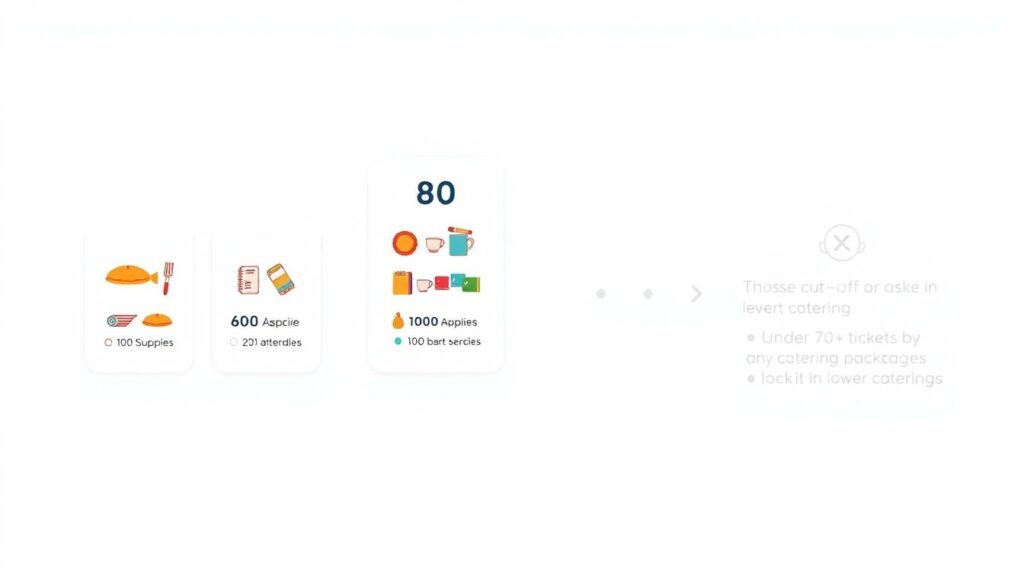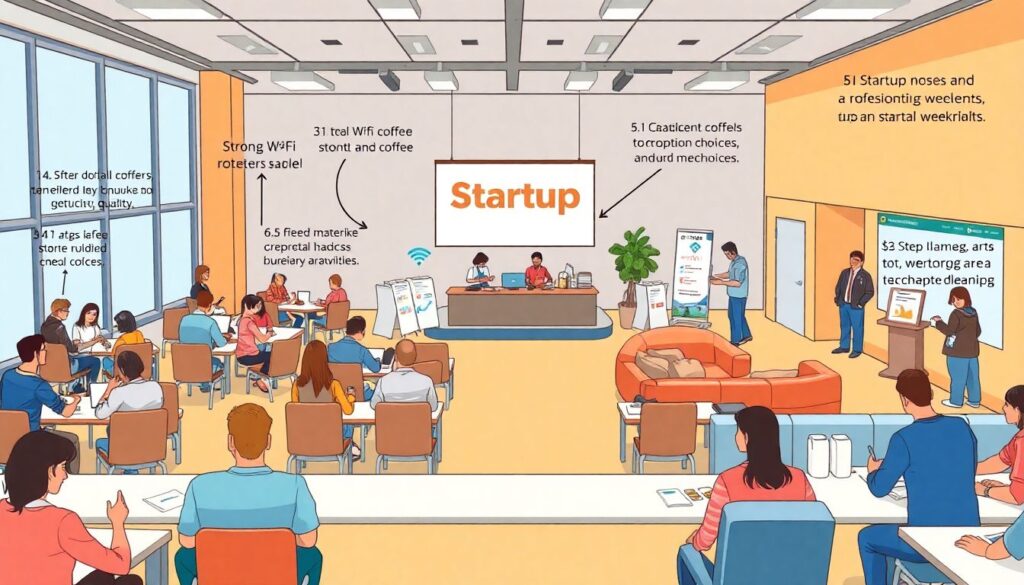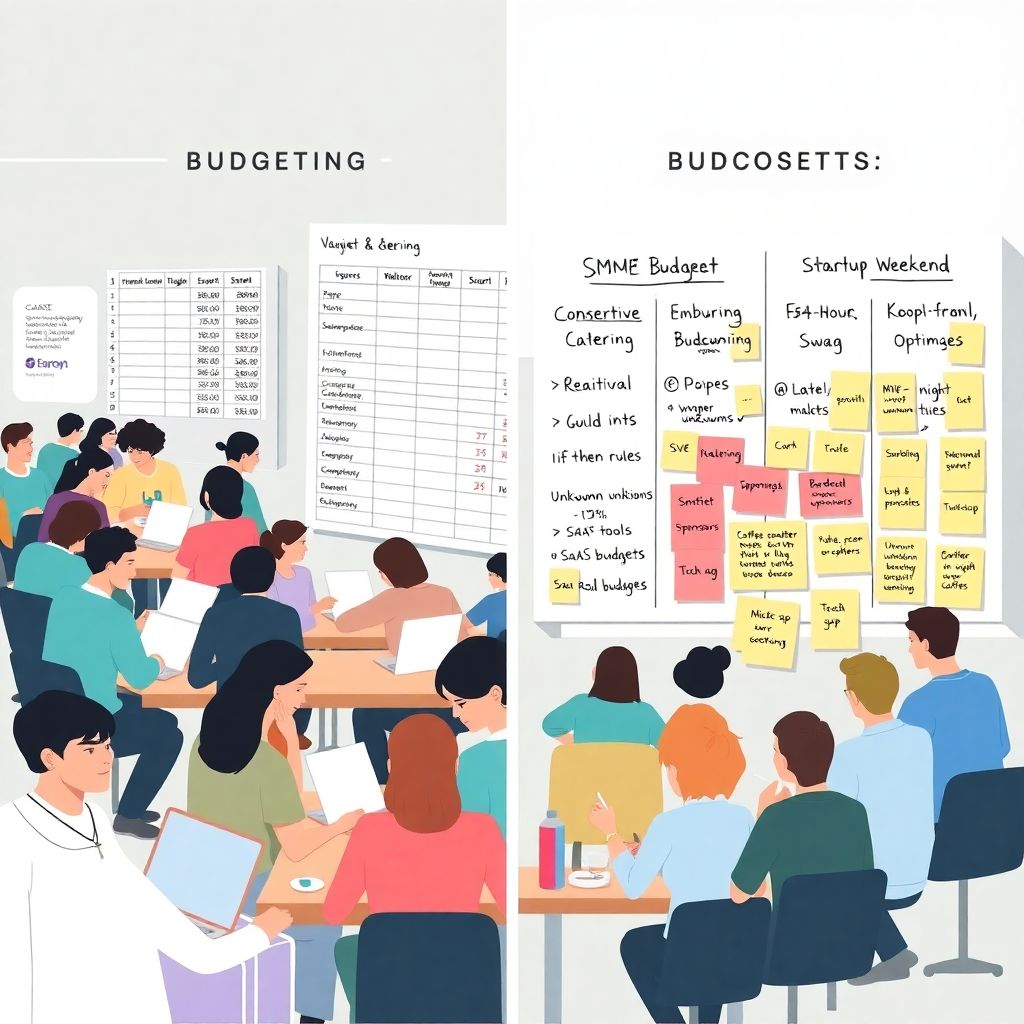Why budgeting for a startup weekend is nothing like normal budgeting
If you’ve ever tried to prepare a budget for a Startup Weekend and thought, “This feels weirdly hard for such a small event,” you’re not alone. Вetween the hype, last‑minute registrations, sponsors, pizzas and random “we need this now” purchases, money leaks everywhere. A normal event budget assumes stability: fixed venue, clear headcount, predictable catering. A startup weekend is chaos by design. That’s why any good startup weekend financial planning guide has to account for uncertainty first, and numbers second. You’re not just calculating costs; you’re designing safety rails so the chaos doesn’t empty your card by Sunday morning.
The core question: what do you really pay for?
Most beginners jump straight into spreadsheets and ask, “How much will this cost?” A better question: “Which three things must be excellent, and what can be ‘good enough’ or even hacked together?” That mental shift completely changes your startup weekend cost breakdown. Maybe your city cares more about food and less about swag; maybe mentors are the real magnet, not the fancy stage. When you pick your top priorities early, you stop overspending on shiny details and start aligning the money with the real experience participants will remember.
Real case: when coffee beat T‑shirts
Organizers in Berlin once planned to spend €1,800 on branded T‑shirts and only €600 on snacks and drinks. Two weeks before the event, one mentor asked, “What if we switch that?” They tested the idea: no shirts, but specialty coffee, fruits, late‑night snacks and a Sunday brunch. Surprise: participants rated “food & energy” as the #1 reason they kept working through the night. Sponsors still got visibility through roll‑ups and social media, nobody complained about missing shirts, and the team saved around 20% of the initial budget. The lesson: things you assume to be “must‑haves” are often just habits you inherited from other events.
Step‑by‑step: how to budget for startup weekend event without losing your sanity
Before you open a spreadsheet or search for a startup weekend budget template, outline your process on paper. Don’t fall into the trap of hunting for “the perfect file” someone used elsewhere; your context is different: currency, venue prices, sponsorship culture, even cultural expectations. Instead, treat any template as a starting sketch and build your own logic on top of it. The goal is not aesthetic perfection, but fast decision‑making: can you say “yes/no” to a new expense in 30 seconds using your budget? If not, it’s too vague.
1. Define your minimum viable event (MVE)
Think like a product manager. What is the smallest, still respectable version of your weekend if everything goes wrong: no sponsor, low ticket sales, venue more expensive than expected? Write down that “bare‑bones” package: simple venue, basic coffee, tap water, cheap snacks, minimal prizes, zero swag. Put actual numbers next to each line. That’s your financial safety net. This MVE becomes the anchor of your startup weekend expenses checklist and protects you from wishful thinking. Any extra money you raise builds on top of this floor, not instead of it.
2. Build three budget tiers, not one
Instead of a single “final” budget, create three stacked versions: conservative, realistic and optimistic. The conservative tier assumes low ticket sales and weak sponsorship; this must still be viable, even if it looks modest. The realistic tier reflects what you truly expect based on local data. The optimistic tier contains the fun upgrades: better catering, extra prizes, video crew, childcare, wellness sessions. This multi‑tier method makes negotiating with sponsors easier because you can literally show them how extra money transforms the experience, instead of waving abstract numbers in front of them.
3. Time‑box decisions instead of line items
Here’s a non‑obvious trick: add deadlines into your budget, not just amounts. For example: “If we don’t secure at least $2,000 in sponsorship by four weeks before the event, we cancel custom swag and upgrade digital branding instead.” These pre‑defined decision gates prevent panic purchases. When you’re under pressure two weeks before kickoff, you’ll be tempted to throw money at every problem. But if your budget already contains clear “if–then” rules, you simply follow the script instead of improvising with your credit card.
Startup weekend cost breakdown: beyond rent and pizza
Let’s unpack where money usually goes. Typical categories: venue, food and drinks, marketing, swag, tools and software, prizes, operations (insurance, cleaning, security, payment fees), and “unknown unknowns.” Many organizers underestimate that last one. A solid rule of thumb is 10–15% of your total budget as a contingency line, not for “maybe nice ideas,” but for guaranteed surprises: urgent taxi for a speaker, extra extension cords, last‑minute vegetarian alternatives, printing emergency banners. If you don’t earmark this buffer, the surprises will blow up some other line and you’ll start cutting where it hurts.
Alternative method: budget by experience, not by category
Instead of listing “Venue: $X, Food: $Y,” try grouping the budget by participant journey: arrival, team formation, work sessions, night shifts, presentations, networking. For each phase, ask: “What do people see, feel, touch, eat, and share on social media?” Then allocate money to those experiences. This experience‑first method ensures the event feels coherent: you don’t overspend on one flashy moment and forget the rest. It also makes your startup weekend financial planning guide much more intuitive when you explain it to partners: you’re not just buying sandwiches; you’re funding an energized Saturday night or a memorable demo day.
Real case: the “silent budget killer” – technical details
In one Eastern European city, organizers proudly nailed down a cheap venue with “great Wi‑Fi” and “everything included.” On Friday evening they realized: no HDMI cables long enough to reach the projector, not enough power strips, and the building’s network choked when 120 people logged in simultaneously. They spent half the night rushing to a 24/7 electronics store and paying premium prices. These extra costs weren’t huge individually, but they piled up because nobody planned them. Since then, that team has a mandatory pre‑event visit with a detailed tech checklist and a small “tech gap” line in their budget.
Non‑obvious funding tricks and creative savings

Most organizers think in binary terms: “We sell tickets” and “We find sponsors.” That’s basic, and often not enough. There are several non‑obvious options that can either bring cash in or free cash up without making your event look cheap. The key is to think in terms of value exchanges instead of just invoices. Who needs exposure to your audience? Who benefits from being associated with innovation and entrepreneurship? Sometimes the answer isn’t another startup tool vendor, but a coffee roastery, a coworking chain, or even a law firm that wants good PR.
Barter and in‑kind sponsorship done like a pro
Barter can be powerful if you treat it like real money. For instance, instead of paying a caterer the full price, you offer “Official Food Partner” status, logo placement, and stage mention in exchange for a discount or partial in‑kind catering. The trick: always assign a realistic monetary value to each barter deal and put it into your budget as both “expense” and “covered by sponsor.” That way, your startup weekend budget template shows the true scale of the event and you don’t fool yourself into thinking “we got it for free,” which often leads to careless over‑ordering.
Time‑limited partnerships with SaaS tools
Dozens of SaaS companies are happy to give free or heavily discounted access for hackathons and startup weekends because they see you as a channel for future users. Instead of paying for project management tools, design platforms or cloud credits, email them a concise pitch: date, expected number of participants, how you’ll feature them (logo on slides, short intro during kickoff, mention in recap email). This saves money and makes your startup weekend expenses checklist lighter on the “tools” line without sacrificing quality. Just be sure to avoid tools with a steep learning curve; participants won’t adopt them in 54 hours.
Advanced budgeting hacks for experienced organizers
Once you’ve run a couple of events, you’ll notice patterns. That’s where professional‑level budgeting starts: using history and data rather than gut feeling. Grab your last two or three budgets and compare planned vs. actual spending. Look for drift: which categories always end up higher than planned? Food? Printed materials? Cleaning? These “usual suspects” deserve either a higher baseline or better constraints. Professionals don’t try to be optimistic; they try to be accurate, and then add controlled buffers.
Pro hack #1: dynamic headcount scenarios

Instead of locking everything on a single expected attendance, build 3–4 attendance scenarios (e.g., 60, 80, 100 participants). For each scenario, pre‑calculate how food, coffee, and supplies scale. Then set clear cut‑off points: if ticket sales stay under 70 by date X, you lock in the lower catering tier and smaller room layout. This dynamic planning avoids the classic rookie mistake: ordering food and swag for 120 people when only 80 show up. You can integrate these scenarios into a flexible startup weekend budget template so updates are as simple as changing the expected headcount.
Pro hack #2: reverse‑engineering your ticket price
Instead of randomly picking a ticket price based on what others charge, reverse it from your conservative budget. Subtract confirmed sponsorship and realistic in‑kind contributions from your MVE cost. What’s left must be covered by tickets. Divide that by your conservative headcount, not optimistic. This gives you a minimum ticket price that doesn’t blow the bank even if registrations are just “okay.” If that price looks unreasonably high for your city, that’s a signal, not a tragedy: you need more sponsors, a smaller venue, or slimmer extras.
Pro hack #3: micro‑budgets within the big budget
Don’t centralize every tiny decision. Give small fixed micro‑budgets to sub‑teams: logistics, marketing, tech. For example, the marketing lead gets a capped amount for ads and printing. Within that limit, they decide channels and formats independently. This speeds up execution and keeps the main organizers from becoming bottlenecks. The crucial rule: no sub‑team can overspend its budget without a group decision. Micro‑budgets also highlight which area consistently generates the best results per dollar, something you can factor into your next startup weekend financial planning guide.
Using checklists without becoming a robot

A good startup weekend expenses checklist doesn’t just list “buy stuff.” It reflects thought: why this item, at this quality level, for this audience? Start with the classic list (venue, Wi‑Fi, chairs, microphones, food, coffee, printed materials, signage, name tags, mentors’ lounge, cleaning, first‑aid kit), then ruthlessly trim or merge items. If something doesn’t clearly improve the participant experience or sponsor value, question it. Checklists are tools, not obligations. They should prevent blind spots, not force you into copying the last event’s mistakes.
Non‑obvious checklist items that save the day
Some of the least glamorous line items make the biggest difference when things go wrong: duct tape, spare chargers, power strips, HDMI adapters, printed backup of the agenda, offline access to participant list, and a few taxi vouchers for emergencies. These cost relatively little but prevent crises from turning into full‑blown disruptions. Experienced organizers pre‑pack a “survival kit” from one event to the next, so they don’t repurchase the same essentials every time. Over a couple of weekends, this tiny bit of discipline pays off more than any one‑time discount you fight for.
Putting it all together: your living, breathing budget
In the end, a startup weekend budget isn’t a static document created once and archived after the event. It’s closer to a real‑time dashboard that helps you make decisions under pressure. Treat your budget as something you revisit at least weekly in the month before the event and daily in the last week. After the weekend, sit down while memories are still fresh and compare predictions with reality. Adjust your ranges, update your assumptions, and store comments right inside the file. That’s how a simple spreadsheet slowly turns into a personalized startup weekend financial planning guide that others in your community will want to copy—and that’s how you go from barely surviving your first event to running consistently sustainable, participant‑loved startup weekends.

